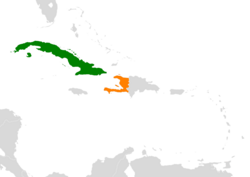 | |
Cuba | Haiti |
|---|---|
Cuba-Haiti relations refer to the bilateral relations between Cuba and Haiti. Cuba has an embassy in Port-au-Prince [1] and Haiti has an embassy in Havana. [2]
 | |
Cuba | Haiti |
|---|---|
Cuba-Haiti relations refer to the bilateral relations between Cuba and Haiti. Cuba has an embassy in Port-au-Prince [1] and Haiti has an embassy in Havana. [2]
In 1959, Cuba and Haiti broke diplomatic relations during the dictatorship of François "Papa Doc" Duvalier. Duvalier broke off relations first after the United States urged member-states of the Organisation of American States to cut ties with Cuba after the Cuban Revolution. In 1977, despite having no official diplomatic ties, the Caribbean Nations signed Cuba–Haiti Maritime Boundary Agreement setting the official maritime border in the Windward Passage. Jean-Bertrand Aristide and Fidel Castro agreed to reestablish relations in 1997 and later that year, a Cuban Embassy opened up in Port-au-Prince. [3]
Since Hurricane Georges, Cuba has sent medical aid to Haiti in the form of doctors, education and medical supplies. Over 3,000 doctors have been sent to Haiti since 1998 and have educated 550 Haitians at Latin American Medical School in Havana with 567 Haitians currently studying at ELAM as of 2010. From 1998 to 2010, Cuba performed over 207,000 Surgeries, restored eye sight to 45,000, 14.6 Million patient-doctor consultations, taught 100,000 how to read and helped in the birth of 100,000 children. In the aftermath of the 2010 Haiti Earthquake, Cuba was among the first responders sending medical teams seeing hundreds of thousands of patients, and performing over 70,000 surgeries. There has been documented change in infant mortality and life expectancy in Haiti due to Cuba's medical aid. [4] [5]
Haitian Cubans number 300,000 in Cuba, with Haitian Creole being the second most spoken language in the country. Many have arrived in recent years due to natural disasters in Haiti such as the 2010 Haiti Earthquake. [6]

Haiti, officially the Republic of Haiti, and formerly known as Hayti, is a country located on the island of Hispaniola in the Greater Antilles archipelago of the Caribbean Sea, to the east of Cuba and Jamaica and south of The Bahamas and the Turks and Caicos Islands. It occupies the western three-eighths of the island which it shares with the Dominican Republic. To its south-west lies the small Navassa Island, which is claimed by Haiti but is disputed as a United States territory under federal administration. Haiti is 27,750 km2 (10,714 sq mi) in size, the third largest country in the Caribbean by area, and has an estimated population of 11.4 million, making it the most populous country in the Caribbean. The capital is Port-au-Prince.

René Garcia Préval was a Haitian politician and agronomist who served twice as President of Haiti; once from early 1996 to early 2001, and again from mid 2006 to mid 2011. He was also Prime Minister from early to late 1991.
Haiti—an island country 600 miles off the coast of the U.S. state of Florida—shares the Caribbean island of Hispaniola with the Dominican Republic. Haiti has received billions in foreign assistance, yet persists as one of the poorest countries and has the lowest human development index in the Americas. There have been more than 15 natural disasters since 2001 including tropical storms, flooding, earthquakes and hurricanes. The international donor community classifies Haiti as a fragile state. Haiti is also considered a post-conflict state—one emerging from a recent coup d'état and civil war.

Haiti–United States relations are bilateral relations between Haiti and the United States. The U.S. supported the revolution against France. Succeeding U.S. presidents refused to recognize Haiti until Abraham Lincoln. The U.S. tried to establish a military base in Haiti and invaded. It withdrew in 1934 but continued to intervene in Haiti during subsequent decades.
Cuban-Pacific relations are diplomatic, economic, cultural and other relations between the Republic of Cuba and countries situated in Oceania. In the 2000s, Cuba has been strengthening its relations with Pacific nations, which have, for the most part, responded favourably to Cuban medical aid in particular. The first Cuba-Pacific Islands ministerial meeting was held in September 2008 in Havana, with government members from ten Pacific countries—Kiribati, Tuvalu, Nauru, Solomon Islands, Fiji, Tonga, Vanuatu, Samoa, the Federated States of Micronesia and Papua New Guinea—attending. The meeting was a consolidation rather than a starting point of Cuban-Pacific relations.
After the 1959 Cuban Revolution, Cuba established a program to send its medical personnel overseas, particularly to Latin America, Africa, and Oceania, and to bring medical students and patients to Cuba for training and treatment respectively. In 2007, Cuba had 42,000 workers in international collaborations in 103 different countries, of whom more than 30,000 were health personnel, including at least 19,000 physicians. Cuba provides more medical personnel to the developing world than all the G8 countries combined, although this comparison does not take into account G8 development aid spent on developing world health care. The Cuban missions have had substantial positive local impacts on the populations served. It is widely believed that medical workers are a vital export commodity for Cuba. According to Granma, the Cuban state newspaper, the number of Cuban medical staff abroad fell from 50,000 in 2015 to 28,000 in 2020.

A catastrophic magnitude 7.0 Mw earthquake struck Haiti at 16:53 local time on Tuesday, 12 January 2010. The epicenter was near the town of Léogâne, Ouest department, approximately 25 kilometres (16 mi) west of Port-au-Prince, Haiti's capital.
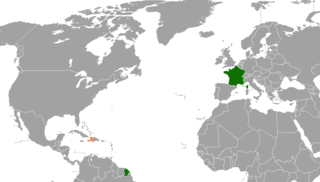
France–Haiti relations are foreign relations between France and Haiti. Both nations are members of the Organisation internationale de la Francophonie, United Nations, and the World Trade Organization.

Henri Ronald Ford is a Haitian-American pediatric surgeon. He previously served as chief of surgery at Children's Hospital Los Angeles and Vice Dean for Medical Education at the Keck School of Medicine of the University of Southern California. He is currently appointed Dean of the University of Miami Miller School of Medicine, effective 1 June 2018. Following the 2010 Haiti earthquake, Ford returned to Haiti to provide medical assistance to earthquake victims.

Haiti was one of the original members of the League of Nations, and was one of the original members of the United Nations and several of its specialized and related agencies. It is also a founding member of the Organization of American States. It maintains diplomatic relations with 37 countries, mostly in Europe and Latin America. Haiti also has diplomatic relations with the Republic of China, commonly known as Taiwan, instead of the People's Republic of China. Taiwan is one of Haiti's major trading partners and the two countries maintain very friendly relations. Haiti has also re-established very warm relations with Cuba in which a major act of bilateral cooperation has resulted in Cuba's large contribution of doctors to the country. The Haitian government has publicly shown admiration to Fidel Castro and his administration.
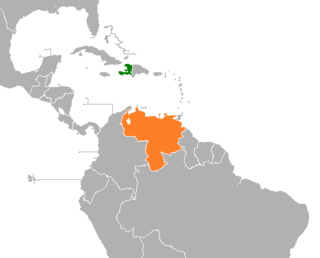
Haiti–Venezuela relations are relations between Haiti and Venezuela. Venezuela has an embassy in Port-au-Prince, and Haiti has an embassy in Caracas.
American Haitians comprise the descendants of free blacks from the United States to Haiti in the early 19th century as well as recent immigrants and expatriates as well as their locally born descendants. At the time of the 2010 Haiti earthquake, there were about 45,000 US citizens living in Haiti.
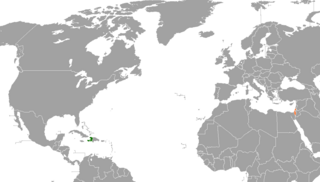
Haiti–Israel relations refers to the bilateral and diplomatic ties between Haiti and Israel. Haiti recognized Israel's independence on 17 March 1949. The Israeli ambassador in Panama represents Israeli interests in Haiti as Israel has an honorary consulate in its capital of Port-au-Prince.

The Embassy of the United States of America in Havana is the United States of America's diplomatic mission in Cuba. On January 3, 1961, U.S. President Dwight D. Eisenhower severed relations following the Cuban Revolution of the 1950s. In 1977, U.S. President Jimmy Carter and Cuban leader Fidel Castro signed an Interests Sections Agreement that permitted each government to operate from its former embassy in Havana and Washington D.C., which were called Interests Sections; they were prohibited from flying their respective flags. Cuban President Raúl Castro and U.S. President Barack Obama restored full diplomatic connections on July 20, 2015.
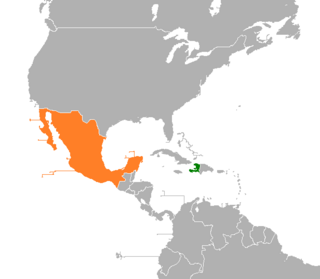
Haiti–Mexico relations refers to the diplomatic relations between Haiti and Mexico. Both nations are members of Association of Caribbean States, Community of Latin American and Caribbean States, Organization of American States and the United Nations.

The Duvalier dynasty was an autocratic family dictatorship in Haiti that lasted almost twenty-nine years, from 1957 until 1986, spanning the rule of the father-and-son duo François and Jean-Claude Duvalier.

Haiti–India relations refers to the international relations between Haiti and India. The Embassy of India in Havana, Cuba is concurrently accredited to Haiti.

Haiti–Taiwan relations refer to the bilateral relations between the Republic of Haiti and Republic of China (Taiwan). Haiti maintains an embassy in Taipei and Taiwan maintains an embassy in Port-au-Prince.
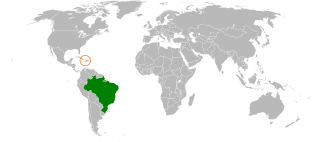
Brazil–Haiti relations refers to the current and historical relations between the Federative Republic of Brazil and the Republic of Haiti. Both nations are members of the Community of Latin American and Caribbean States, Organization of American States and the United Nations.